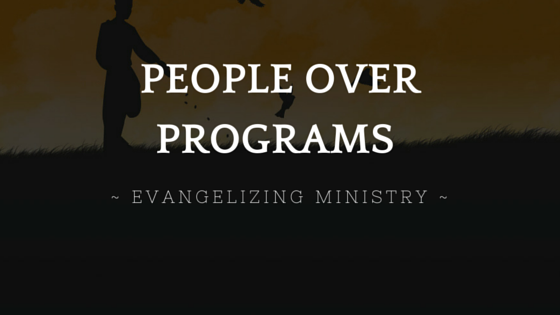First, I set out to learn what Jesus did to evangelize. He healed; he proclaimed; and he taught. This became Part 1 and Part 2 of To Heal, Proclaim, and Teach.
Next, I set out to find the models that were working best in evangelizing ministries today. Clearly personal formation, one-on-one discipleship, small group ministries, and remarkable large group events work well today. This became Part 3 of To Heal, Proclaim, and Teach.
Finally, I went and interviewed or researched some of the most effective ministers and ministries healing, proclaiming, and teaching in the Church today. These stories are spread throughout the book, but are the particular focus of Part 4 of To Heal, Proclaim, and Teach.
All of this work turned into two years of work and a 300-page book.
As I have been reflecting lately on what I hope this book will do for the Church, I keep coming back to one phrase.
I keep asking myself: what is my vision for a new way of doing ministry based on all the research and writing I have done? I shared some of this vision in this article about religious education (read it here). I expanded on it in this article about evangelizing parents (read it here).
I keep coming back, though, to a simple phrase that I think really gets to the point.
I think it is this vision for ministry that Jesus modeled and shared. It is the vision that the Apostles accepted and showed us too, especially in the book of Acts. It is this same vision that has been realized and formed with the help of all the great saints and successful Church leaders throughout the last 2,000 years.
The vision is essentially this:
People over programs.
A “program mentality” seems by all accounts a recent invention. I think we can all understand why this is the case. When trying to serve hundreds and thousands of people all in one place, it makes sense to organize them into buckets of children’s programs and teen youth programs or adult faith formation programs.
I’m not an advocate for a complete overhaul. I don’t think it would be wise to completely throw out the ministries we all participate in and lead (though in some cases it wouldn’t hurt). The familiar models, like parish religious education classes and “youth group” or adult speaker series, get people in the doors.
No, my simple message is this:
Don’t let the program (the ministry, the office, the organization, the event, etc.) get in the way of being a healing presence in the lives of the people who need to feel accepted, understood, and loved.
Don’t let the laws and doctrines stand in the way of proclaiming the good news that transformed your life and the encounter with Christ that others can experience in order to have this transformation. Don’t let the curriculum stand in the way of inviting a curious mind to explore what is really important.
I let my identity as “Mr. Dees” the teacher stand in the way of becoming a healing presence in the lives of many of my students and parents over the years. I was afraid to be vulnerable, afraid to be human. I put the program before the people. From a personal perspective, this is why I feel so strongly about the need for us to change. It is the change I see that I need to make the most in myself.
What “People Over Programs” Means
People over programs means slowing down before an event you have been planning and having a conversation with someone you should get to know. You might be overwhelmed with stress about pulling off this event, but you let it be for a moment and focus on being present to the people instead.
It means taking the time to consider why someone is asking–no attacking–what you are teaching about the Catholic faith. Rather than respond with anger and arguments, you consider where the question is coming from. You give your best try at a loving response always connecting what you are saying to the love of Christ.
Focusing on the people over the program when starting something new gives you permission to act when starting something new. There’s no need for year-long strategic planning meetings or fully fleshed out plans for new programs. Instead, it begins with an invitation to one person to start something with you. Then it spreads to two more people, then eight more, etc. This is how successful young adult ministries are forming in the Catholic Church today. These people aren’t scratching their heads about how to reach this new generation of millennials. Instead, they are meeting them one-on-one, face-to-face and inviting them to something new and interesting. Things grow from there.
When you focus on the people rather than the program, you shift your focus. You stop worrying about the numbers and steer your mind and heart towards making an impact on just one person at a time. It is a slow process but an effective one. You can share life-changing stories about the people you have mentored and met with. Those stories fill your heart with joy in retelling them. In the past, when you focused on programs more than people, you shared an empty analysis of the number of people that showed up at your events. You got caught up in the number of seats filled and the amount of money left over in the budget. Now, though, things are different. You’ve got a different focus and better stories to tell.
To put the people first and program second is to forgive yourself for not being the expert. Like the mostly uneducated and underprepared disciples who followed Jesus in the Gospels, you fail often. But the failure doesn’t get you down. You’re not building a program. You’re helping people. You do your best. They will forgive you if you fall short. You’re trying your hardest and you care. It’s the caring that matters. It’s the caring that makes an impact and its the caring that keeps them coming back again.
Most of all, focusing on the people over the programs keeps you grounded and reliant upon God. You trust in the Holy Spirit rather than the programs and processes you have created. It’s not your ministry or your program or your class that matters. It is the people that God puts in your path that gives you the opportunity to make a difference. These encounters are mostly unexpected because they are competely in God’s control. This requires faith; it gives you hope; and ultimately you learn how to love.
…
To Heal, Proclaim, and Teach is my invitation to you to pursue this vision of people over programs with me. There are so many leaders and ministries exemplifying this shifting focus today and I was glad to be able to feature them in the book.
The book is just the beginning. We have a long way to go.
What about you? Where have you seen this vision become a reality? How working towards this vision today?




I am enjoying To Heal, Proclaim, and Teach. Thank you for you’re efforts in writing this book. I was at ND Vision for the last three years. We brought some youth from our parish, Blessed Sacrament, Walpole, Ma. You make reference to NDVision in you’re book, were you there?
Thanks Joe! I know Lenny and Meghan well, but I haven’t participated in any way other than hosting a trivia night for the leaders many years ago. Love ND Vision.